How to Hire an Offshore Dedicated Development Team
- Updated: Nov 11, 2024
- 18 min
Wondering if an offshore development team is right for your software project? As an entrepreneur, founder, or project manager, hiring offshore can boost expertise and reduce costs.
This guide covers:
- What offshore dedicated teams are
- Benefits of offshore development
- Key considerations before hiring offshore
- Common offshore hiring challenges
Whether you’re a startup or an enterprise, this will help you evaluate if an offshore team fits your needs.
We’ll explain offshore team models in simple terms, with no fancy lingo required. Actionable advice in easy-to-digest nuggets.
Prefer visuals? Jump ahead to the infographic for key highlights.
Want to build a productive remote team? This guide on high-performance remote teams shows you how.
Transform your ideas into reality with our dedicated development team — contact us today to get started!
What is an Offshore Dedicated Software Development Team?
An offshore dedicated software development team is an aggregated group of foreign developers situated outside the shores of a startup, with the primary responsibility of creating and maintaining technological products for the startup.
Here’s a simple example: the US-based startup outsources its product development and desides to hire a dedicated development team in Ukraine.
Although similar, this type of team varies with a dedicated development team as the name “offshore team,” suggests that it’s a workforce based outside the startup’s country. This location difference enables startups in high-income nations to tap into lower wages in other middle-income ones.
Statistics from Deloitte show that 72% of startups prefer outsourcing over in-house developers. Suggesting that there’s already a shift in demand towards this business model.
Another statistic that aligns with this assumption is that 300,000 jobs get outsourced out of the U.S. yearly.
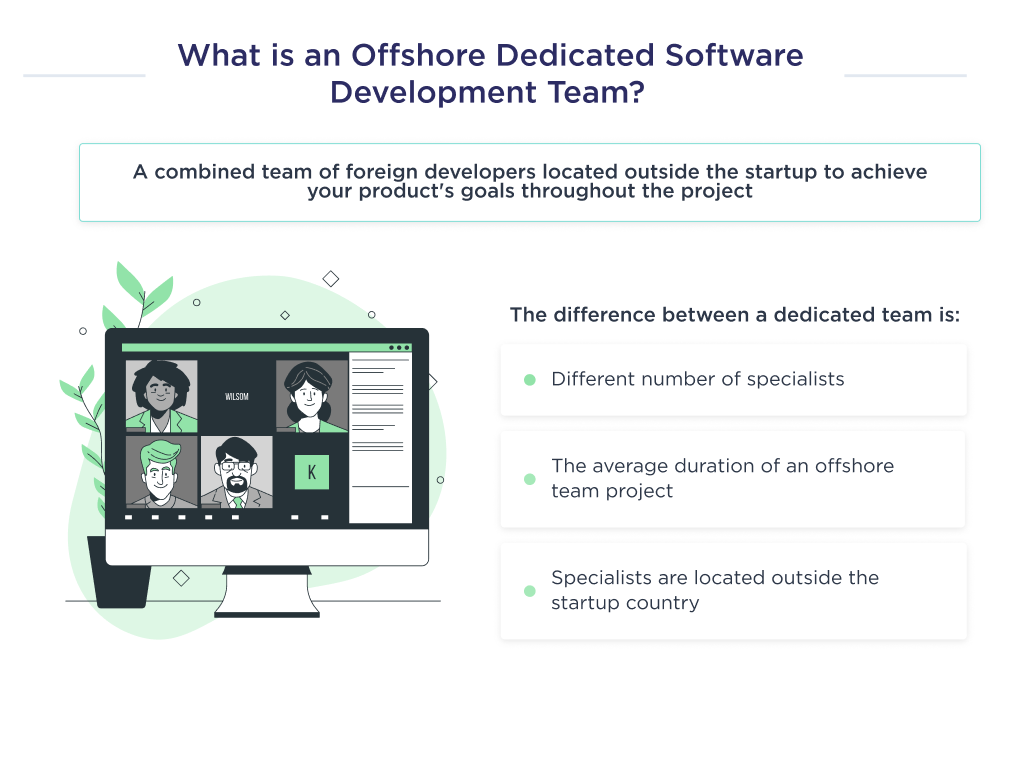
With your knowledge of what an offshore development team means, let’s discuss its pros.
Why Consider Hiring an Offshore Development Team?
Offshore software development teams offer startups access to over 26.9 million software developers worldwide, as opposed to being limited to only developers within their locality. It’s the best option for startups that want to build a great product at the best price obtainable.
Let’s further elucidate this IT outsourcing model:
1. Lack In-House Expertise
Startups’ failure rate is 90%, and 23% of those failures are caused by a lack of expertise.
By embracing the offshore outsourcing model, you can easily leverage a software development agency’s talent network to fill a knowledge gap in your startup. How so?
For example, you’re willing to build a solution to key into the metaverse marketplace. Such innovation requires a developer fluent in Web3JS, a language with just 18,000 developers around the world.
Most offshore development teams have a Web3 JS developer in-house or on call. As such, you can fill the knowledge gap without undertaking a cumbersome recruitment process.
2. Access More Talent
IT outsourcing agencies give you access to a larger pool of talents than onsite staffing. This is particularly important for the existence of Silicon Valley-based startups. How?
Most California-based developers are employees of tech giants. They receive bogus salaries, and attractive perks and are comfortable with their current employers. However, this is a challenge for startups since most of them can’t afford a salary scale that’s at par with tech giants.
On the contrary, offshore countries like Ukraine, Hungary, Romania, Belarus, and others in Eastern Europe are full of skilled developers that would readily join your startup.
Examples of startups currently doing this include Fab, SeatGeek, and AppSumo.
Check out the best countries to outsource software development for top choices.
3. Faster Scaling and Flexibility
Scaling your in-house team to conform to dynamic project scope or stage can be challenging.
Especially for startups domiciled in nations with restrictive hiring and downsizing laws. The good news is that offshore outsourcing is flexible, and you can hurriedly increase or reduce your team size without recourse to any law preventing that.
If your project is still in its project discovery phase, your project blueprint is susceptible to change. Most vendors take note of this reality, and they have a standby team that you can easily call upon.
4. Cost Savings
SpdLoad reports that 37% of startups fail due to a lack of money. However, you may avoid this problem by partnering with an offshore team.
Offshore outsourcing offers one of the most effective ways to save on the cost of software development. This is because the cost of hiring a software programmer varies with location.
Developer rates in offshore countries are more reasonable than their American and Western European programmers. Hiring a dedicated workforce from India, Latin America, or Eastern Europe is often twice cheaper as the US, the UK, and Australia.
As depicted in this article, hiring a US-based developer costs $100-150 an hour. However, opting for a Ukraine-based developer of equal tech skill will cost you $40-$80 an hour.
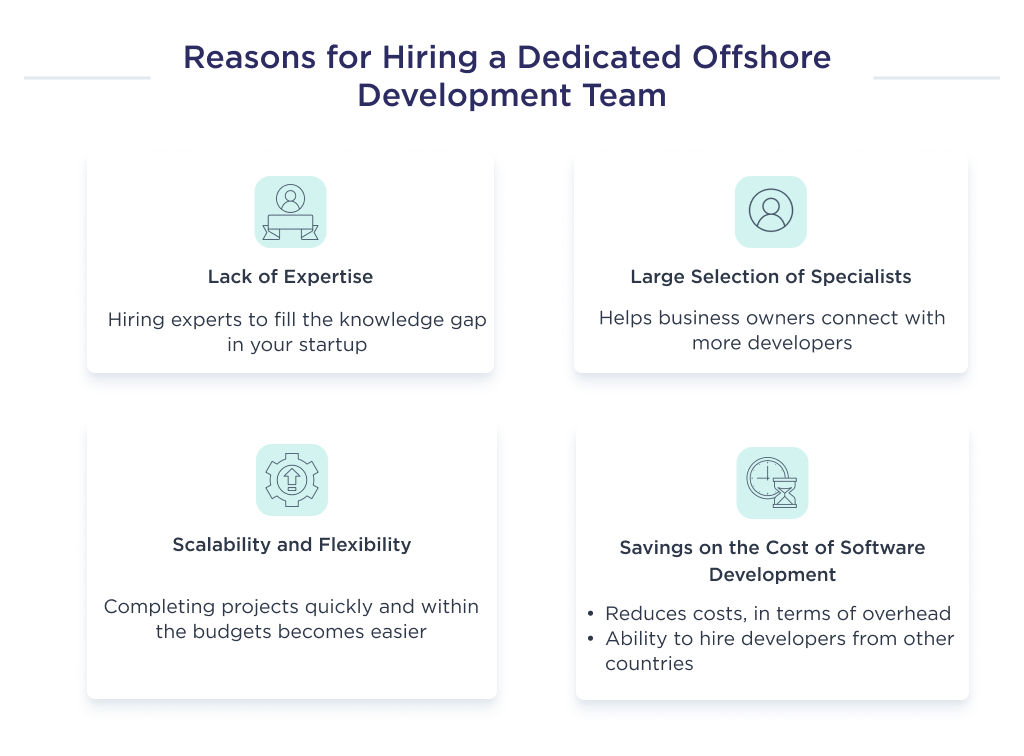
With the above information in mind, let’s discuss some salient points before hiring an offshore team.
Key Considerations Before Hiring an Offshore Team
Hiring a dedicated development team for your startup is not a guarantee of success. It’s imperative to understand your project goals, your deliverables, and have a befitting budget for the development process.
For a better understanding of things to do before you hire offshore developers, let’s discuss each of the points raised above in detail:
1. Define the Project Scope
The crux of your interaction with the offshore team will be ensuring you have a perfect product. However, this is unattainable without a good knowledge of your expected deliverable.
First, identify your product type. Is it a web app, a custom website, a mobile app, or a WordPress website? The option you opt for here will, in turn, determine the tech stack you’ll need.
Considering custom WordPress website development? We explain the benefits and what it takes to get started.
Here are some examples of app types and their corresponding technology stacks.
| App Type | Tech Stack |
| Native mobile application development |
|
|
|
Some offshore companies have a team specialized for each project type. There are also developers for each type of startup. So, it’s best beforehand to communicate these salient details to a preferred vendor.
It makes it possible to hire a dedicated web development team or, for example, hire a dedicated mobile app developers, that perfectly suits your business goals.
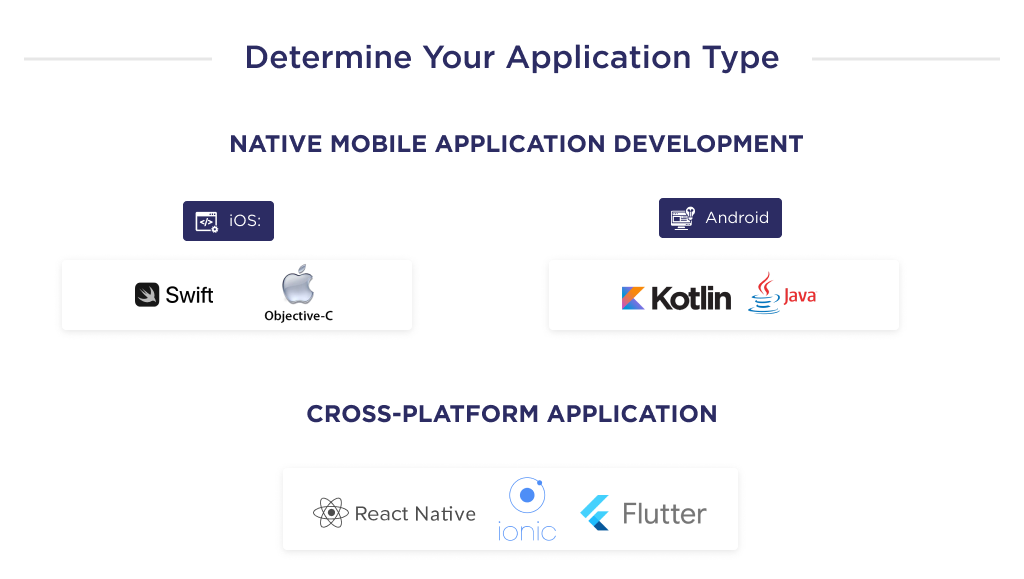
2. Choose the Preferred Team Structure
Now that you know your expected deliverable. Which type of team can best build and maintain your dream platform?
Would you rather have a workforce of industry experts? Or a reliable technical partner? Or perhaps you’d rather have a team made of doers?
Each team type has its peculiarity.
- A group of industry experts provides in-depth insight on the best strategy for your product development. However, hiring a team consisting primarily of experts can be financially demanding.
- They are fast-paced developers who get the job done in record time for doers. However, the crux of the discovery phase lies on you as they only follow the template you’ve given.
- A reliable technical partner is a compendium of both doers and experts in the right proportion. They have experts that can help guide the team through its discovery phase and doers that write the code according to the approved blueprint.
Each of these options covers different levels of engagement, different types of management, different deliveries, and different prices.
Another choice is opting for an offshore team that handles retention and hiring but doesn’t manage the developers. Here, the crux of management lies solely on you.
To guarantee that you have your desired team, you’ll need to vet each developer you’re the vendor provides. Non-technical founders should hire a CTO for this.
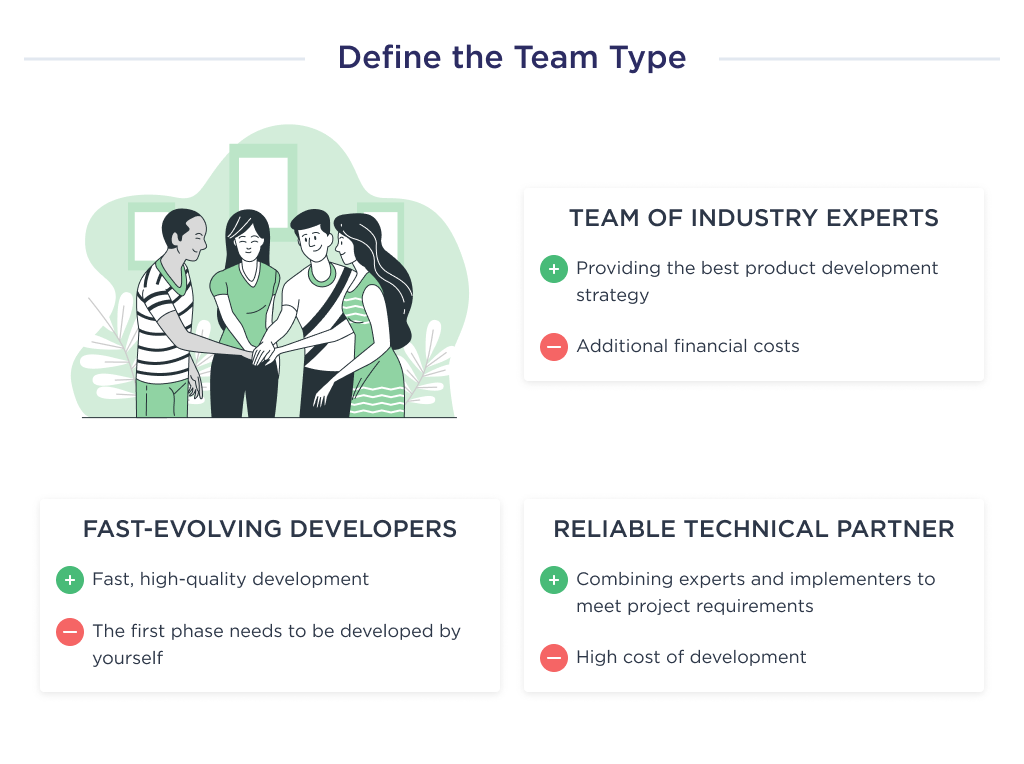
3. Set Budget and Deadlines
29% of startups fail because of budget failure. To prevent this, it’s imperative to develop a definite budget and a realistic deadline.
Unless your budget is unlimited – a scenario that’s highly unlikely for startups, you should appropriately communicate your deadlines to the team’s business analyst and project manager.
Discuss expected functionalities and features during the meeting. And highlight the timeframe for the completion of each feature. Mode of engagement and regulatory requirements are also salient points to discuss.
At the end of the meeting, there should be an agreed expense for each milestone, means of payments, and payment schedule.
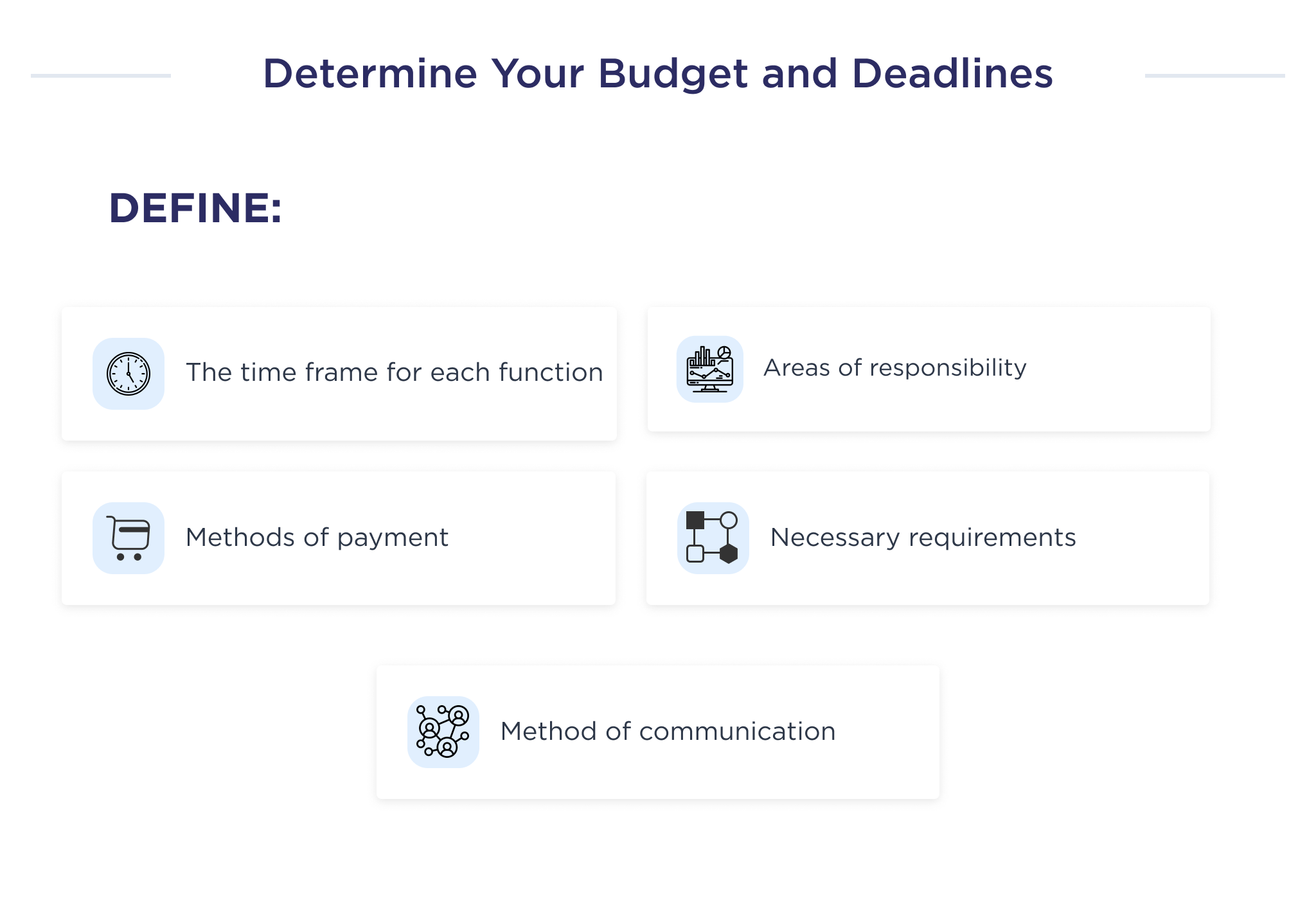
Once both sides have agreed on the above information, the next step is assembling your offshore developers. Let’s help you with the constituents of a qualified workforce.
Typical Offshore Team Structure
The configuration of your development team depends on what you’re trying to build. For example, if you’re building an AI software, you need an AI engineer.
If interested, you can see the numbers behind the AI revolution in our latest article on AI statistics.
A blockchain project requires a blockchain engineer among others.
For illustrative purposes, we’ll create a checklist of team members for a typical app with basic features:
- Product manager
- Project manager
- Business analyst
- UX/UI designer
- Back end developer
- Mobile developer or front end developer
- Quality assurance tester
- DevOps engineer (siscover which DevOps trends are set to impact the future of software development)
Non-technical founders may be aloof to the meaning of each role. Thus, we’ll explain what they entail:
| Role | Description |
| Product manager | The product manager gathers and prioritizes the customer requirements for the product.
They also ensure that the product’s vision is achieved by working closely with the support team. |
| Project manager | Project managers ensure the development process is completed on time and within budget. |
| Business analyst | The business analyst creates an ideal business requirement for the product.
These requirements form the logic for the product’s features. |
| UX/UI designer | A UX/UI designer researches and evaluates technical requirements from the business analysts and project manager.
They then design a suitable User Interface that aligns with project expectations. |
| Back end developer | The back-end developer is a programmer that writes the code for the server-side database. This code is the basis on which every functionality in the application lies. |
| Front end developer | The front-end developer implements the User Interface Design of the UI/UX designer. They also create actionable buttons for users to interact with. |
| Quality assurance tester | The quality assurance tester validates the efficacy of the application and suggests any design, business logic, and code improvement. |
| DevOps engineer | The DevOps engineer oversees the code releases. They build, test, and maintain the infrastructure needed for optimum software development.If you want to learn more about DevOps specialists, check out our DevOps glossary that covers key terms to help you stay on top of DevOps practices and tools. |
Non-technical founders should discuss the best combination for your project with their CTO.
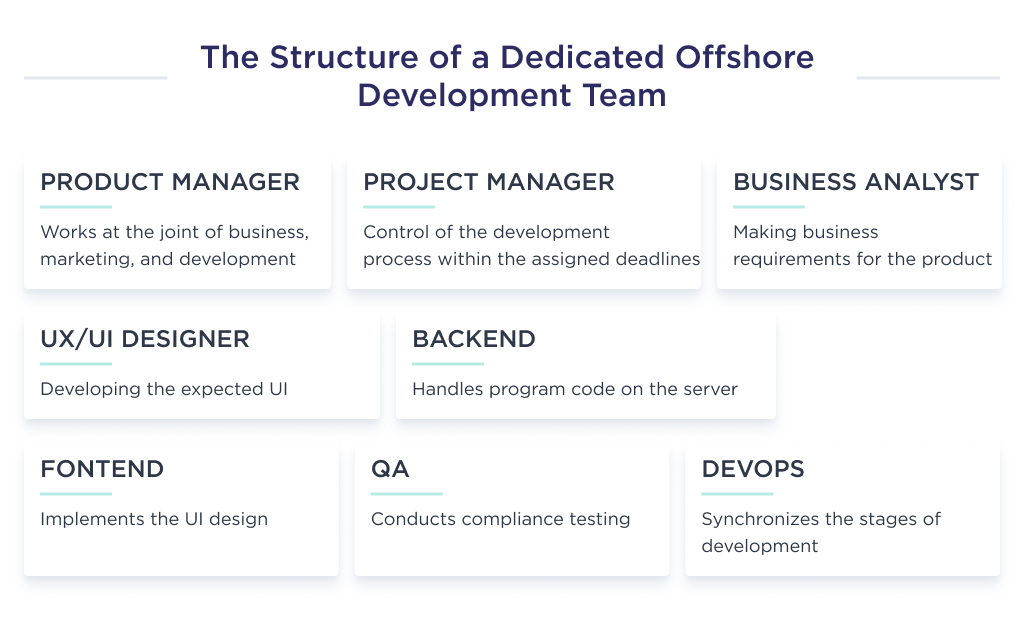
To help you understand your outsourcing option, we’ll discuss the types of dedicated offshore workforce out there.
Offshore Team Collaboration Models
There are three prominent dedicated development team structure types: extension, project-based, and dedicated team.
Each has its pros and cons. Before choosing your preferred option, it’s pertinent to first consider the project’s complexity, time, and budget and then choose the most convenient option.
We’ll discuss the types at your disposal.
From concept to creation – launch your marketplace with SPDLoad!
1. Dedicated Team
A dedicated development team is a group of experts assembled with a primary aim to develop and maintain software.
This workforce comprises many experts assigned to distinct roles which border on designing, developing, and maintaining the software.
According to the stipulated methodology, the team works full-time, just like your in-house workforce. The only thing here is that they’re located offshore.
Their project deliverable depends on the requirement of the discovery phase.
The dedicated team outsourcing model is best for:
- Startups with enough funds and an aim to capture a target market quickly;
- Startups with plans to engage in a long-term project;
- Startups that need a robust team but lack time to set up an in-house team;
- Startups or scale-ups whose in-house workforce lacks the expertise to develop complex functionality.
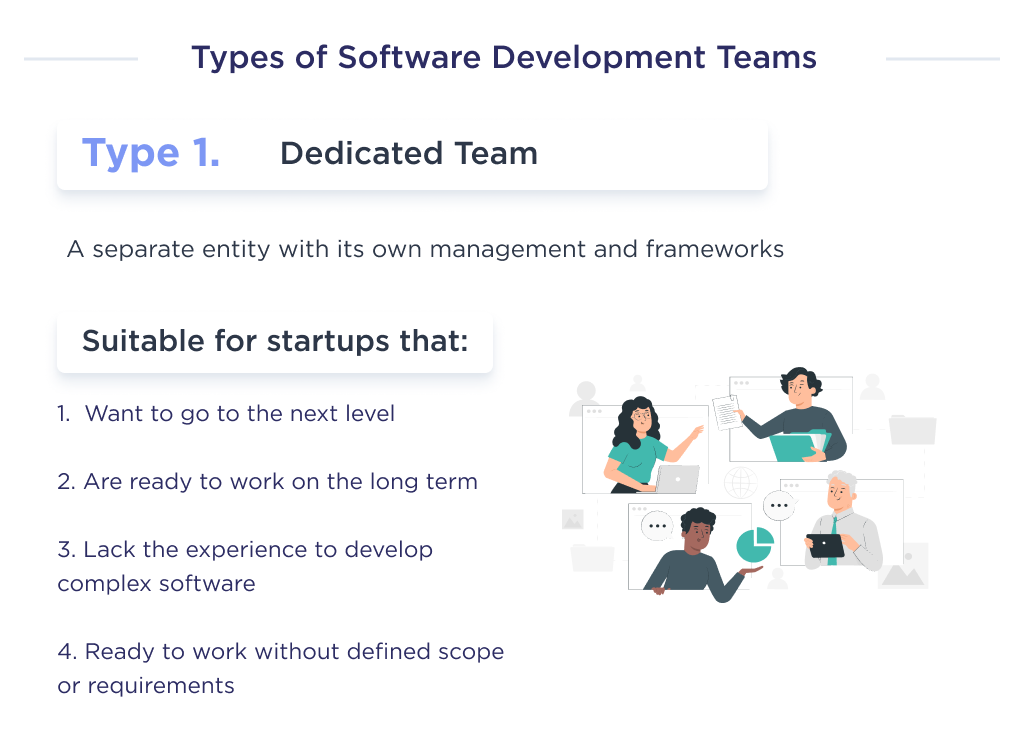
If the above points describe your startup, the dedicated team should be your preferred option.
2. Expand In-House Team
This outsourcing model includes adding lacking expertise from a vendors’ team to your in-house workforce.
Thus ensuring sensitive functionalities are embedded in the solution within your internal ecosystem. For example, if you need a developer with knowledge of Python for machine language. You can approach a vendor for an offshore Python programmer to help with the feature.
This outsourcing model helps to solve the problem without bothering about recruitment costs. The developer will also come at a lower price than opting for onshore staff.
This model gives you an overview of your team’s workflow. Additionally, it reduces the burden of recruiting while you focus solely on coordinating the project’s outcome.
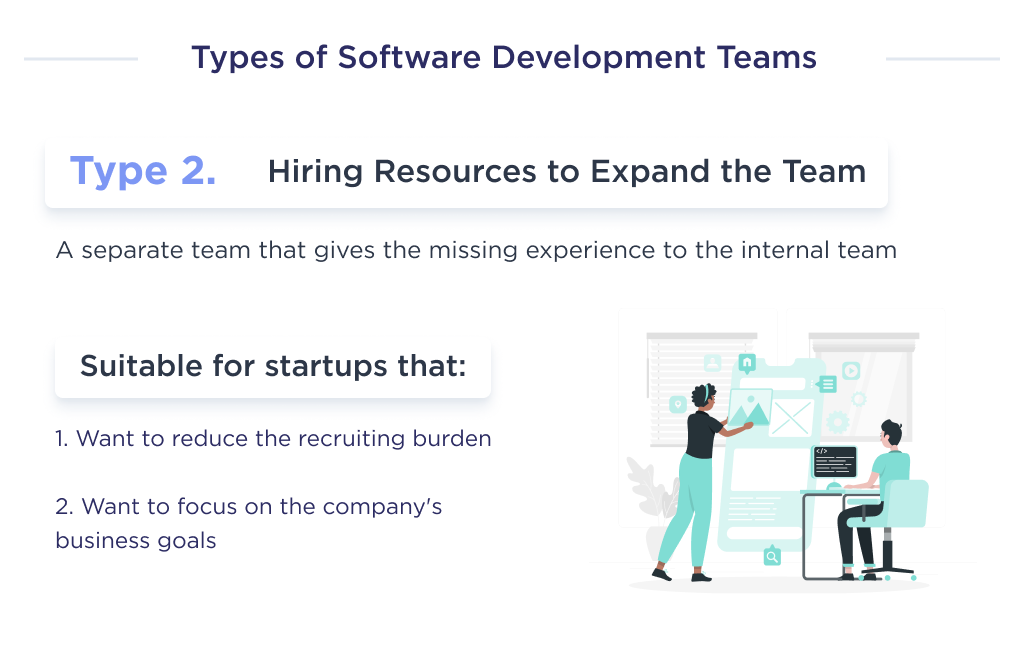
3. Project-Based Staffing
This outsourcing model entails hiring an outsourced web development team to work on specific functionality within a software. What does this mean?
Take for example your plan to create a FinTech app. This consists of multiple functionalities: payment features, API integration, authentication, etc.
Although your in-house team may create other functionalities, you may hire a vendor’s workforce to build the payment feature due to its complexity.
This teaming type is best for startups and scale-ups that need:
- Quick feature for deployment;
- Cost-efficient quick-fix solution;
- A resource and skill-demanding task.
However, it’s worthy of note that the options above aren’t suitable for offshore development outsourcing alone.
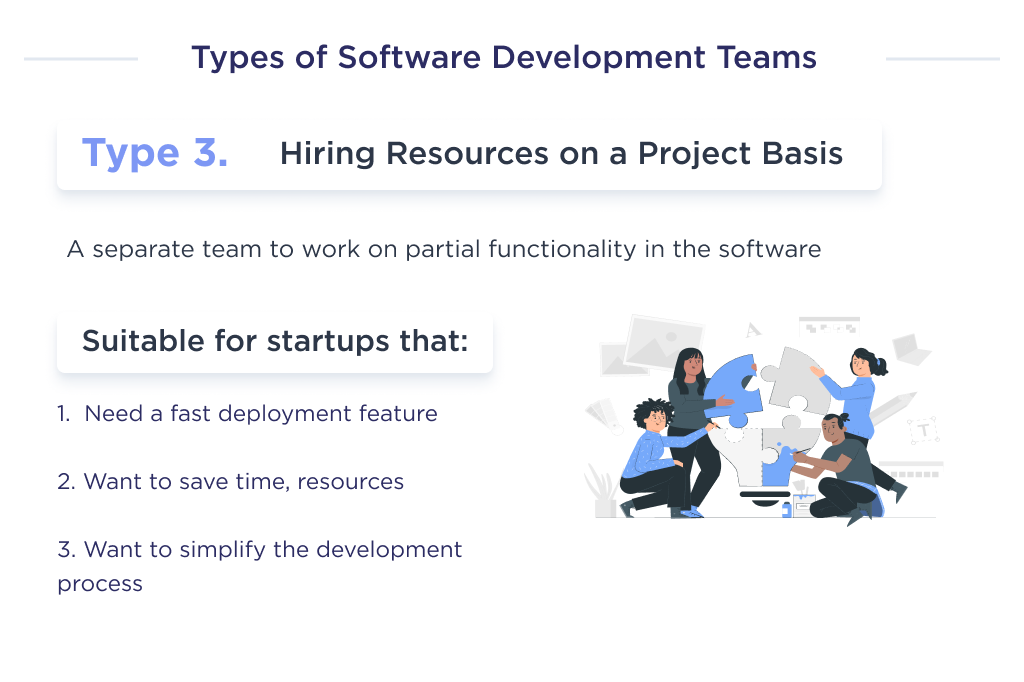
We’ll help make a detailed comparison to offshore outsourcing – this way, you can make the most suitable choice.
Offshore vs. Alternatives
There are many alternatives to offshore outsourcing. Before you hire an offshore team, you might first consider the alternatives to this model. Let’s dive right in.
Offshore vs. In-House
A dedicated in-house team is a workforce of developers broken into teams, where each handles different projects.
Every developer here is employed, managed, and paid by the startup they work for. This workforce model allows startups to have control over the workflow and helps to synergize communication among team members and the management.
Although this is the most prominent employment model, it has demerits to consider. Here’s a spreadsheet of its pros and cons.
| Pros | Cons |
|
|
In comparison to offshore teams, the in-house workforce is financially demanding. Startups domiciled in the US, the UK, and other high-income nations can find cheaper offshore development companies in middle-income nations.
Another team type to consider is the local development agency. Let’s help you understand that.
Offshore vs. Local Agency
A local development agency is a dedicated team of outsourced developers domiciled in the same country as the startup — for example, the US-based startup outsourcing its development and maintenance to the US-based software development company.
Opting for a local development agency has some merits and its demerits. Let’s consider both below:
| Pros | Cons |
|
|
Offshore vs. Freelancers
The difference between these two outsourcing options is quite difficult to delineate. But let’s help you with that.
Chances are high that they’ll be offshore if you’re hiring freelancers. However, they differ from an offshore development team because they work fully on your project.
On the other hand, freelance teams also take jobs from other clients, and they may abandon your project without any prompt.
Also, an offshore development team is hired through a vendor or a software development service. Let’s help you understand the pros and cons of a freelance development team:
| Pros | Cons |
|
|
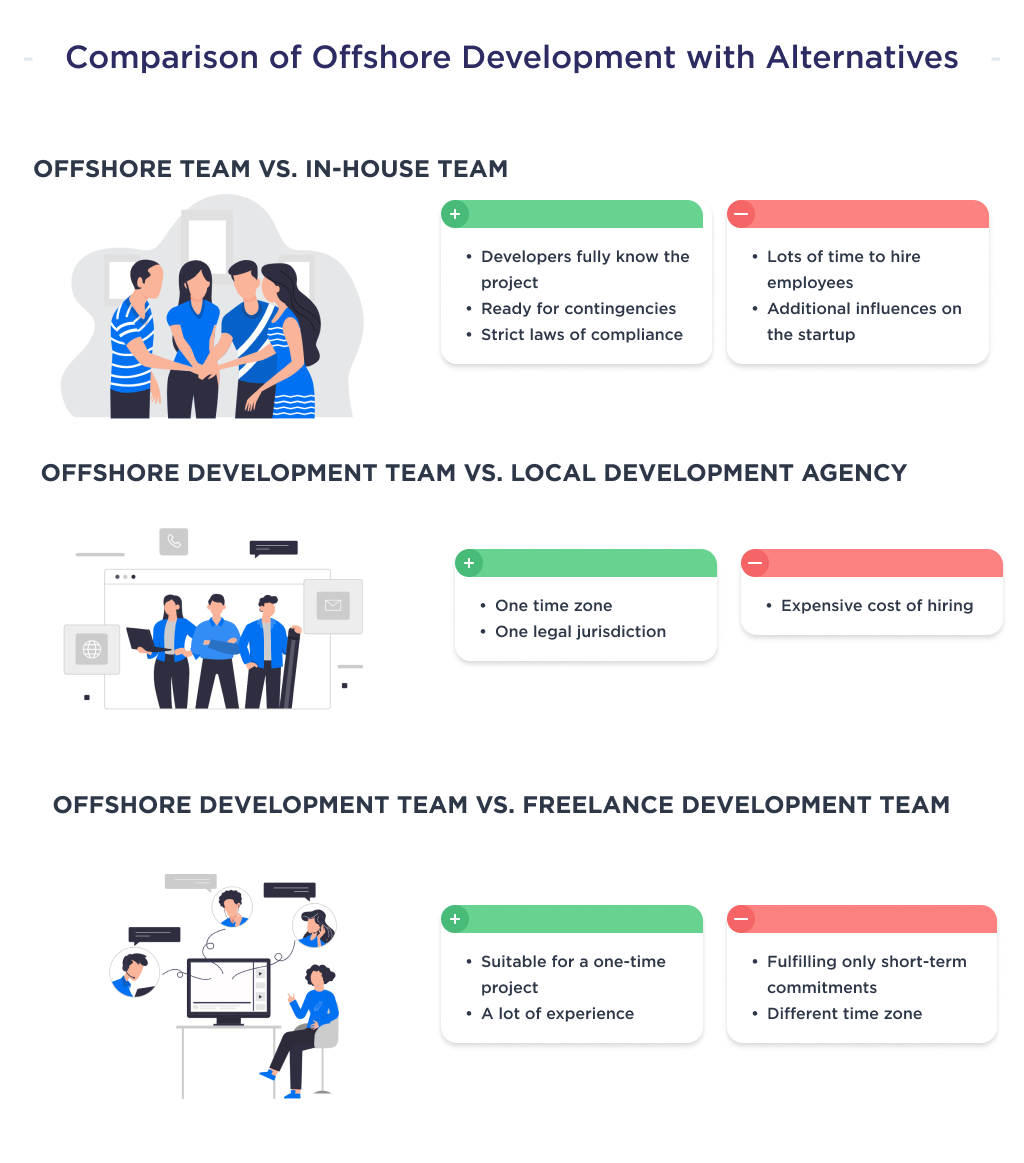
Now that you’ve understood the alternatives to offshore development, let’s discuss the cost of partnering with one.
Best Countries for Offshore Development Teams
The software can be developed anywhere. Thus, you’re at liberty to hire an offshore team from any location around the world.
However, some nations have the infrastructure and quality human resources to make them one of the best places for hiring offshore development teams.
1. Latin America
Latin American nations like Argentina, Brazil, and Mexico are the best option for sourcing offshore software developers in the region.
However, Chile is also making giant strides in the sector as it’s currently rated as the nation with the 27th most skillful programmers in the world.
Here are some merits and demerits of choosing Latin America as a preferred region for outsourcing:
| Pros | Cons |
|
|
2. South Asia
Asia perhaps has the highest cluster of developers in the world. As it stands, the region has 7 million developers, with India alone having 5 million developers. Other outsourcing nations in South Asia include China, the Philippines, Vietnam, and Bangladesh.
Here are some advantages and demerits of choosing south Asia as a preferred region for outsourcing:
| Pros | Cons |
|
|
3. Africa
Africa offers one of the cheapest means of hiring offshore developers. Offshore developers charge a paltry sum of $20 hourly in Kenya, Morocco, and Egypt.
However, South Africa and Nigeria cost $40 – $50 an hour. Overall, about 20,000 software developers in all five countries mentioned above.
Here are the pro and cons of hiring a team of developers in Africa:
| Pros | Cons |
|
|
Find the best TypeScript developers for your project.
4. Eastern Europe
Eastern Europe has a cluster of some of the best software development companies in the world.
Developers in this region have broad commercial experience and understand diverse programming languages, among which are JavaScript, Python, Node.js, and Java.
Eastern Europe has nearly 1 million developers, with hourly rates ranging between $35 and $50 per hour. The exact figure is determined by the developer’s experience, skills, and project complexity.
The most prominent outsourcing destinations are Ukraine, Belarus, Czech Republic, Bulgaria, Serbia, Slovakia, and Poland.
Here are the benefit and disadvantages of outsourcing to Eastern Europe:
| Pros | Cons |
|
|
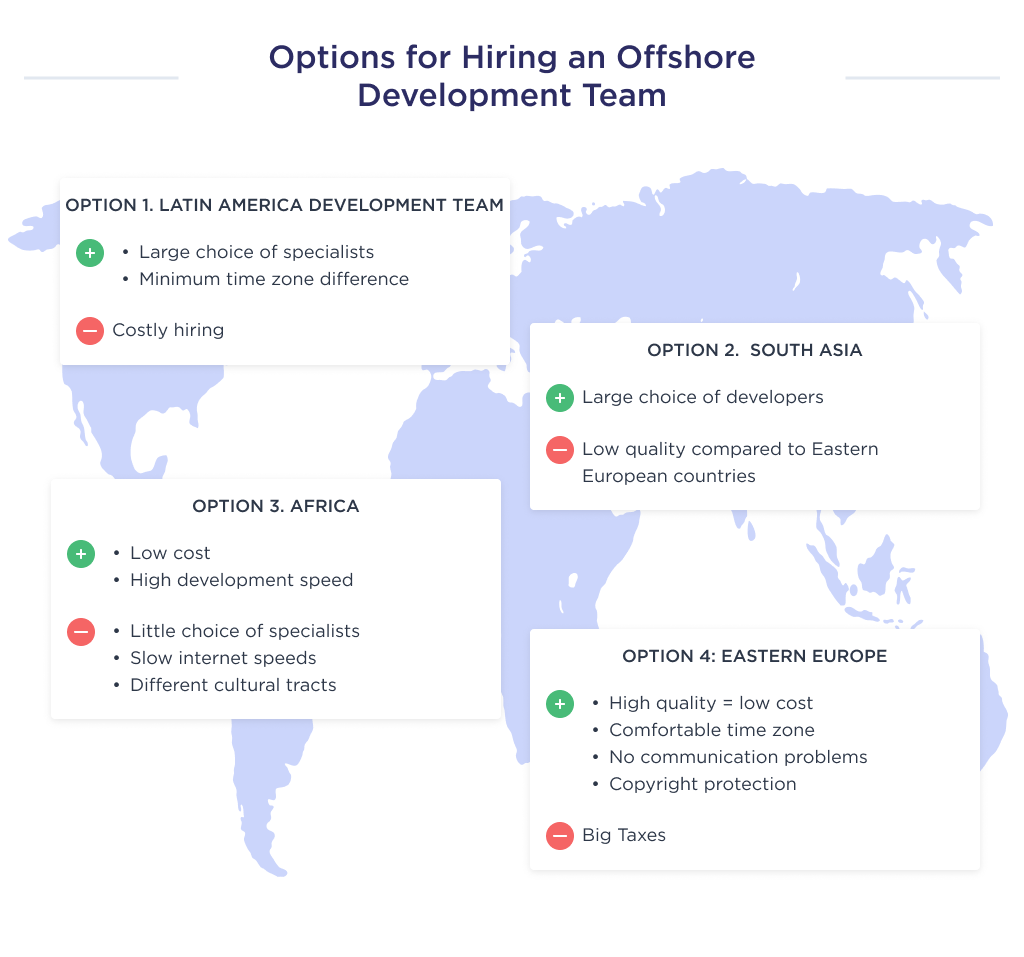
From the information given above, it’s imperative to conclude that outsourcing to Eastern Europe is the best option.
Nations in this region balance out cost-effectiveness and competency. This is partly due to its relatively low cost of living and the nation’s tech-friendly infrastructure.
How to Hire an Offshore Development Team
Choosing the right offshore workforce is not a “walk in the park.” Every offshore team you approach will give your reasons why they’re the best.
To know the best, you’ll have to research, validate their claim, and create a top-notch engagement model.
Below is a breakdown of 3 important steps to hiring offshore tech companies:
Step 1: Find Team Candidates
Finding a good workforce is easy when you know the right place to search. Below is a spreadsheet of where founders have successfully found skilled software engineers.
| Where to Find | Details |
| Freelance platforms | You can find an offshore team on freelance sites like Upwork.
Upwork is a platform featuring several professionals, including web and mobile app developers. |
| Business listings | Business listings are platforms or printed lists that provide information on businesses within a niche. E.g., Clutch. |
| LinkedIn helps recruiters find their needed workforce. With over 810 million members, you can easily find any needed tech talent on the platform. | |
| Your Network | Referrals account for over 30% of new hires. As such, you can easily find needed tech talent by researching your network of professionals.
Since you’re finding an offshore team, it’s best to reach out to project managers, founders & co-founders, and tech entrepreneurs. |
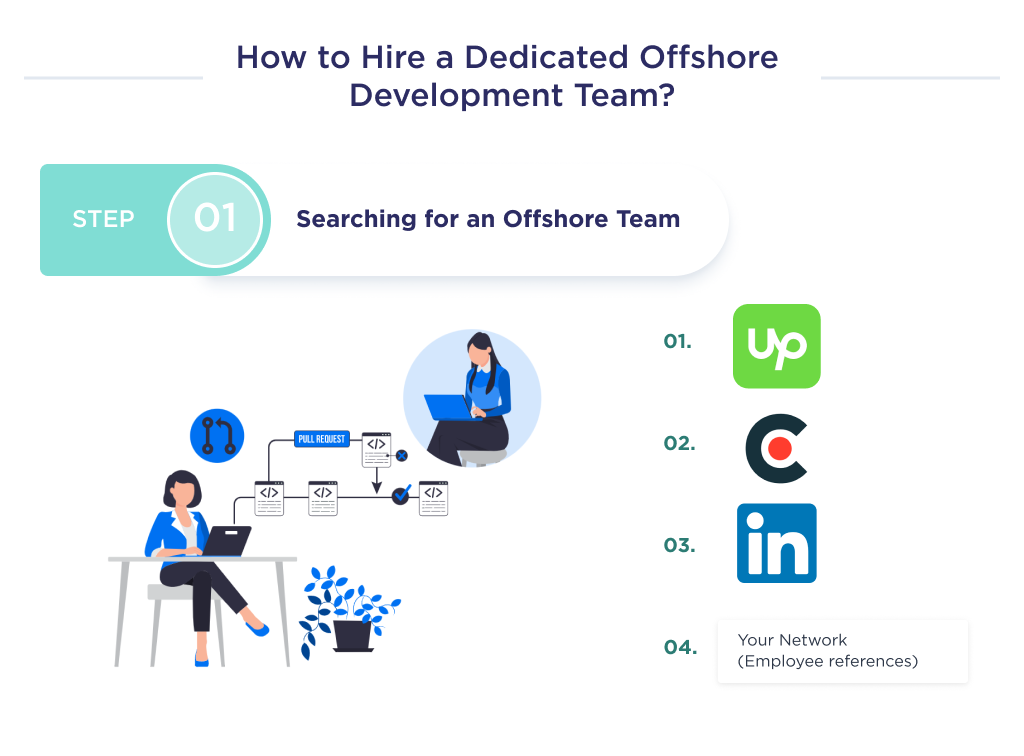
Step 2: Select Best Fit
To determine the best, it’s best first to highlight your project requirements and partner with a CTO to choose the team that can deliver.
Use platforms like Clutch and Good Firm to research the company’s pedigree.
A team to partner is one whose project portfolio suggests experience and has the perfect component for what you plan to build.
Here is the three-step to choosing a great workforce that suits both your technical and business needs:
Carry out an Independent Research
During your independent research, ensure you find out the company’s location, their hourly rate, the team’s expertise, the company’s project portfolio, and other general info.
Hold Briefs with the Team
If you carry out your independent research well, then the chances are high that you’ll have lots of software companies as your potential partners. However, you’ll need to settle for one that’s best equipped to meet your goals.
And when you finally hire dedicated remote development team, discuss timelines and how to bridge any differences on both sides. You’ll also need to appropriately communicate your project details, business, and technical requirements, and your vision for that project in your startup.
Validate the Information
Albeit optional, it can be beneficial to hire an expert to validate every piece of information you’re provided with.
However, this option has to be approached with care as some experts cunningly convince their clients to patronize another service they have a vested interest in.
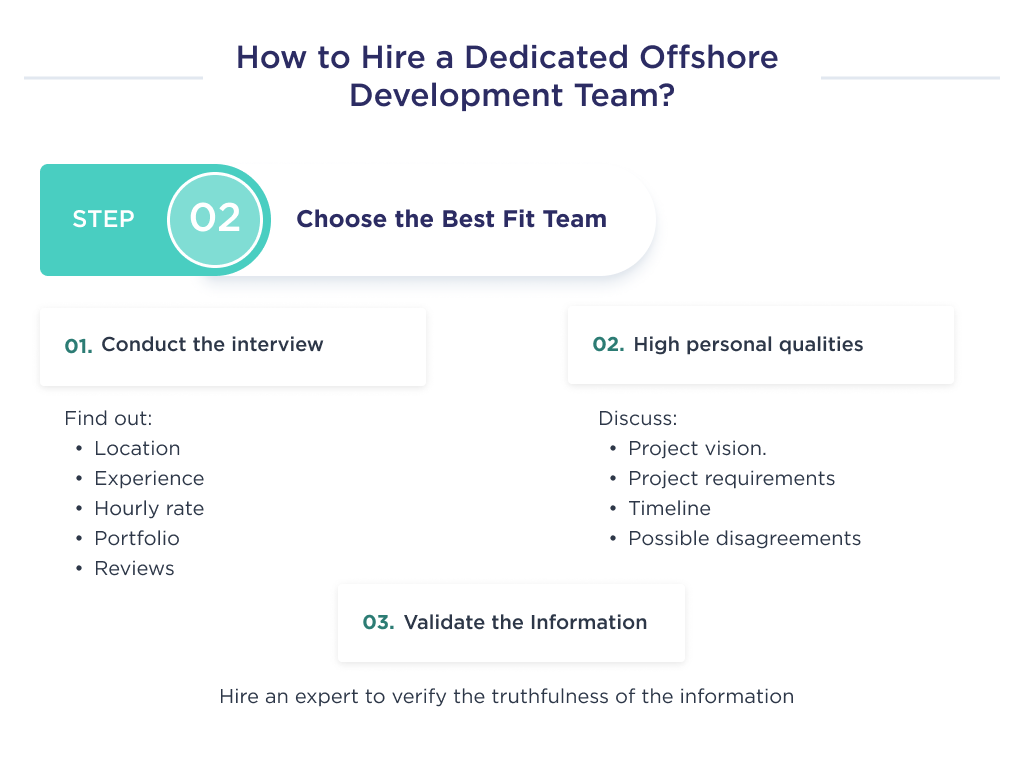
Step 3: Finalize Agreements
Now that you’ve established communication with a preferred team, the next step is to formalize your agreement by signing the requisite documents for legal backing.
Now that you’ve identified a preferred software development agency to partner with, you should draft a mutually beneficial contract and sign a non-disclosure agreement.
Let’s dig more into what this entails.
Sign a Non Disclosure Agreement
To prevent legal backlash, data leaks, and copyright protection, it’s imperative to sign an NDA.
A Non-disclosure Agreement is a piece of document binding the vendor and every team member from disclosing details about your product to a third party.
Get a Detailed and Transparent Contract
The contract you sign must spell out the following:
- Hourly rate with a detailed breakdown of estimated timeframe if it’s a project-based contract;
- Discounts;
- Payment protocols;
- Credit periods;
- Warranty conditions.
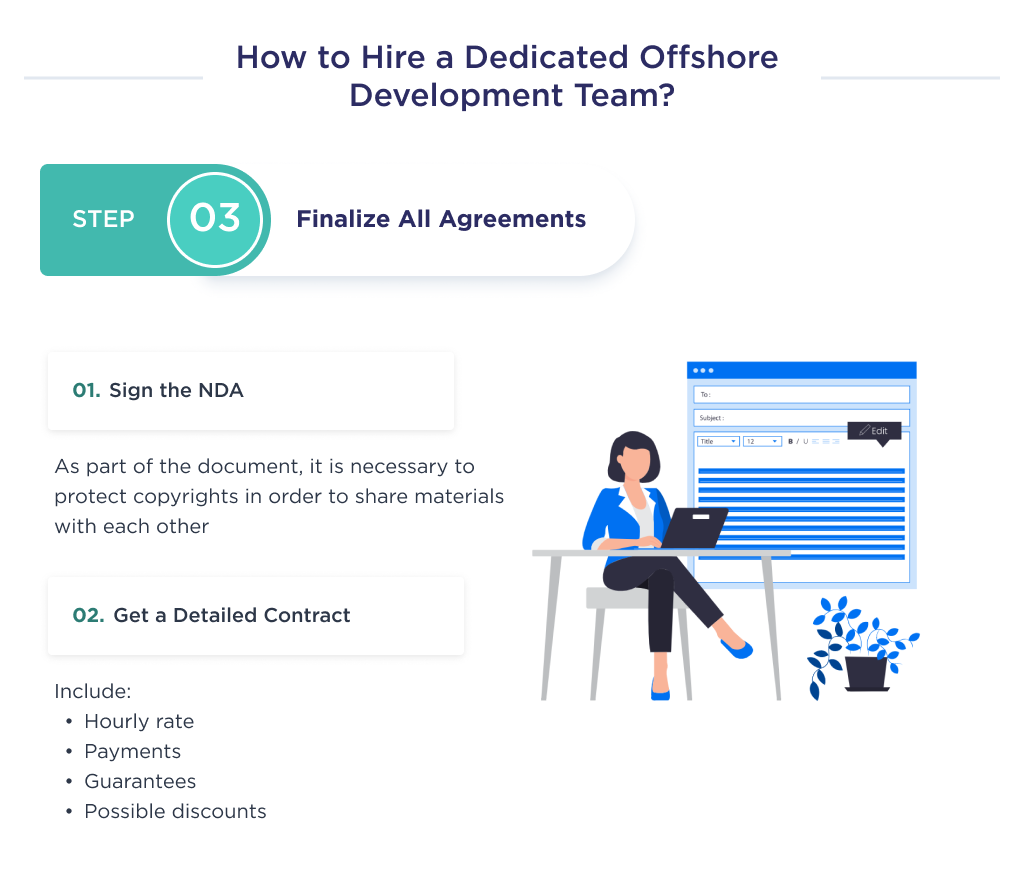
Is outsourcing all that easy? Definitely not. We’ll discuss some challenges it entails below.
Challenges with Offshore Teams
There are numerous challenges to hiring an offshore software team. Here are some noteworthy challenges.
1. Multiple Vendors
The abundance of software development companies in popular offshore markets can prove to be a challenge. It’s hard to choose the most suitable out of many options.
To make this easy, you might want to read the section above that teaches that.
2. Time Zone Differences
If you outsource your mobile app development to another time zone, you may find it difficult to synchronize your in-house workforce and the offshore team.
However, this may be an advantage in some instances. For example, if you’re based in New York and you have a Ukrainian offshore team. It means your Ukraine – based workforce would be ready to have lunch when you wake.
This means they would have completed some tasks before lunch, ready for review.
3. Cultural Gaps
Westerners may find some cultural differences serving as an impediment to smooth workflow. To overcome this, you might opt for a Ukrainian team as they have similar practices to Westerners.
4. Limited In-Person Interaction
You’ll have some communication barriers with your team members. However, there’s a solution: you may occasionally visit the offshore team, which is more applicable for nearshoring. Another solution is holding regular video conferences using tools like Skype, Google Meets, or Zoom.
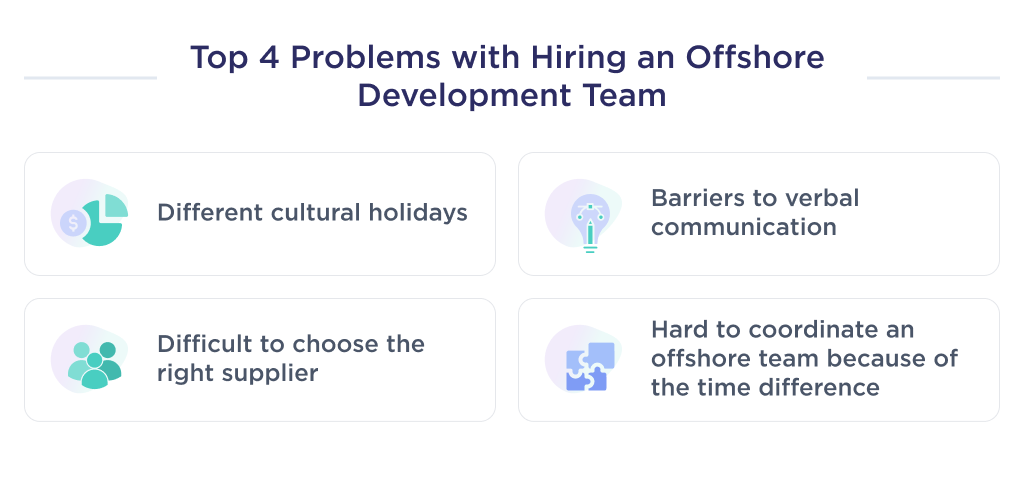
Now that you have an apt understanding of offshore outsourcing in tech. It’s time to start hiring.
Ready to Hire an Offshore Team?
Hiring an offshore dedicated development team can be a strategic move to access top talent and optimize development costs. However, finding the right partner is crucial.
Discover more in our app development partnership guide.
At SpdLoad, we have 10+ years of experience building and managing high-performing offshore teams for startups, agencies, and enterprises.
Whether you need to prototype an app, build a complex platform, or simply extend your in-house capabilities, we have the expertise.
Schedule a free consultation to explore how an offshore development team can empower your initiatives without the typical headaches.
Let’s chat about how we can translate your ideas into reality.
Bonus Infographic
Here is a summary of our detailed guide. Learn what an offshore dedicated software development team is and the basic steps you need to take to hire an offshore dedicated development team












